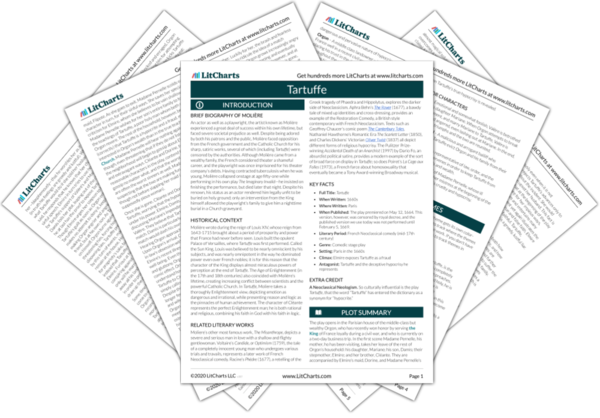Summary
Analysis
Valère enters urgently, bringing terrible news: he has heard that Tartuffe has brought the contents of the strongbox to the King, and that police officers are on their way to arrest Orgon…led, of course, by Tartuffe. He urges Orgon to flee, as does Cléante.
Disloyalty to the King is a terrible crime, one that would lead to an awful punishment for Orgon well beyond the loss of wealth: torture, even death. Tartuffe has made good on his threat, having thrown aside all pretense of Christian charity and in a triumph of hypocrisy appears even to have manipulated the King’s anger against Orgon (remember how in the first scene the good will of the king was established as the basis for all of Orgon’s prosperity, so this is a dire blow indeed).
Themes
Before Orgon can run away, however, Tartuffe enters, followed by the Officer, and announces that Orgon must go to prison. Although the other family members hurl verbal abuse at him, Tartuffe remains implacable and self-satisfied, claiming that he wishes only to serve his King. Dorine marvels that Tartuffe can pervert such a sacred symbol and use it for his own purposes, while Cléante attempts to argue with the hypocrite, but to no avail.
Just as Tartuffe used the Church to manipulate Orgon, now he uses the king to threaten his former “friend.” He has moved, just as Dorine says, from one sacred symbol (the Church) to another (the King). Cléante again attempts to use reason, but in the face of Tartuffe’s power even reason has no strength.
Themes
Tartuffe orders the Officer to arrest Orgon—but instead of doing so, The Officer announces that he means to arrest Tartuffe. He explains to a shocked Orgon and his family that the King, unfooled by hypocrisy, easily saw past Tartuffe’s lies, and recognized him as a criminal and an imposter who had committed many other “vicious crimes.” He goes on to return Orgon’s papers from the strongbox, and to invalidate the deed that gave Tartuffe all of Orgon’s property, all in the name of the King, whom he says is rewarding Orgon for his recent service in the civil wars.
This turn of events is nothing short of miraculous. It takes an almost divine act of the King in order to extract Orgon from Tartuffe’s grip. This is a testament to Orgon’s catastrophic blindness, and to the all-powerful nature of the King, who has essentially stepped in to protect the family since Orgon—the family patriarch himself—was incapable of doing so. This turn of evens while sudden and shocking, also does two things: it makes the King seem almost divine in his wisdom and mercy, and in doing so exalts King Louis IX, who was the extremely powerful King of France when Moliere was writing. It also extends the metaphor of fatherhood, as the King, the “father” of the nation, steps in to restore order to Orgon’s family when that order had been destroyed by Orgon’s foolishness and Tartuffe’s monstrous usurpation of Orgon’s “fatherly” power over the family.
Themes
The family is relieved; as the women praise God, Cléante stops Orgon from insulting Tartuffe, telling him that it is undignified to do so, and that he should instead hope that one day Tartuffe will understand the error of his ways. He urges Orgon to give thanks to the mercy of the King. For once, Orgon takes his wise brother-in-law’s advice, and the play ends with Orgon resolving first to give thanks to the King, and second to give Mariane to Valère, whom he at last recognizes as a man worthy of his daughter.
The play ends on a largely optimistic note, as the characters praise the King and Orgon for once gets the better of his emotions and follows Cléante’s advice in favor of moderation and thanksgiving. Mariane’s impending marriage also creates both a true religious note to end the proceedings, as well as re-establishes the proper order of the family by providing Mariane with a suitable and loving husband.
Themes
Get the entire Tartuffe LitChart as a printable PDF.













